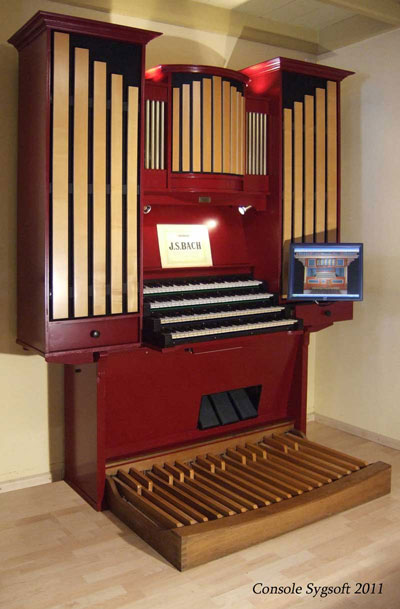|
Definition
|
A
|
B
|
C
|
D
|
E
|
F
|
G
|
H
|
I
|
J
|
K
|
L
|
M
|
N
|
|
(14 bit) Absolute minimum of one channel without combinations and without recorded tremulant
|

|

|

|

|

|

|
14
|
48
|
14
|
48
|

|

|
2.0
|
1.6
|
|
(14 bit) Absolute minimum of one channel, combinations and recorded tremulant included
|

|

|

|

|

|

|
14
|
48
|
14
|
48
|

|

|
3.2
|
2.8
|
|
(14 bit) Absolute minimum with 2 channels without combinations and without recorded tremulant
|

|

|

|

|

|

|
14
|
48
|
14
|
48
|

|

|
3.5
|
3.1
|
|
(14 bit) Absolute minimum with 2 channels, combinations and recorded tremulant included
|

|

|

|

|

|

|
14
|
48
|
14
|
48
|

|

|
5.8
|
5.3
|
|
(14 bit) Absolute minimum of 3 channels without combinations and without recorded tremulant
|

|

|

|

|

|

|
14
|
48
|
14
|
48
|

|

|
5.1
|
4.6
|
|
(14 bit) Absolute minimum of three channels, combinations and recorded tremulant included
|

|

|

|

|

|

|
14
|
48
|
14
|
48
|

|

|
8.6
|
8.1
|
|
(16 bit) with one channel, without combinations and without recoded tremulant
|

|

|

|

|

|

|
16
|
48
|
16
|
48
|

|

|
2.4
|
2.0
|
|
(16 bit) with one channel, combinations and recorded tremulant included
|

|

|

|

|

|

|
16
|
48
|
16
|
48
|

|

|
4.0
|
3.5
|
|
(16 bit) with 2 channels, without combinations and without recorded tremulant
|

|

|

|

|

|

|
16
|
48
|
16
|
48
|

|

|
4.4
|
4.0
|
|
(16 bit) with 2-channel, combinations and recorded tremulant included
|

|

|

|

|

|

|
16
|
48
|
16
|
48
|

|

|
7.5
|
7.0
|
|
(16 bit) with 3 channels, without combinations and without recorded tremulant
|

|

|

|

|

|

|
16
|
48
|
16
|
48
|

|

|
6.4
|
5.9
|
|
(16 bit) with three channels, with combinations and recorded tremulant
|

|

|

|

|

|

|
16
|
48
|
16
|
48
|

|

|
11.2
|
10.7
|
|
(16 bit) multi release with 1 channel without combinations and without recorded tremulant
|

|

|

|

|

|

|
16
|
48
|
16
|
48
|

|

|
3.4
|
3.0
|
|
(16 bit) multi release with one channel with combinations and recorded tremulant
|

|

|

|

|

|

|
16
|
48
|
16
|
48
|

|

|
5.6
|
5.2
|
|
(16 bit) multi release with 2 channels without combinations and without recorded tremulant
|

|

|

|

|

|

|
16
|
48
|
16
|
48
|

|

|
6.5
|
6.1
|
|
(16 bit) multi release with 2 channels with combinations and recorded tremulant
|

|

|

|

|

|

|
16
|
48
|
16
|
48
|

|

|
11.0
|
10.5
|
|
(16 bit) multi release with 3 channels without combinations and without recorded tremulant
|

|

|

|

|

|

|
16
|
48
|
16
|
48
|

|

|
9.6
|
9.1
|
|
(16 bit) multi release with 3 channels with combinations and recorded tremulant
|

|

|

|

|

|

|
16
|
48
|
16
|
48
|

|

|
11.2
|
10.6
|
|
(16 bit) multi release with 1 channel without combinationses and without recorded tremulant
|

|

|

|

|

|

|
16
|
48
|
16
|
48
|

|

|
4.9
|
3.0
|
|
(16 bit) multi release with 1 channel and combinations and recorded tremulant
|

|

|

|

|

|

|
16
|
48
|
16
|
48
|

|

|
8.2
|
5.2
|
|
(16 bit) multi release with 2 channels without combinations and without recorded tremulant
|

|

|

|

|

|

|
16
|
48
|
16
|
48
|

|

|
9.5
|
6.0
|
|
(16 bit) multi release with 2 channels with combinations and recorded tremulant
|

|

|

|

|

|

|
16
|
48
|
16
|
48
|

|

|
16.1
|
10.5
|
|
(16 bit) multi release with 3 channels without combinations and without recorded tremulant
|

|

|

|

|

|

|
16
|
48
|
16
|
48
|

|

|
13.8
|
9.1
|
|
(16 bit) multi release with 3 channels and with combinations and recorded tremulant
|

|

|

|

|

|

|
16
|
48
|
16
|
48
|

|

|
23.7
|
15.8
|
|
(24 bit) multi release with 1 channel without combinations and without recorded tremulant
|

|

|

|

|

|

|
24
|
48
|
24
|
48
|

|

|
6.1
|
5.6
|
|
(24 bit) multi release with 1 channel with combinations and recorded tremulant
|

|

|

|

|

|

|
24
|
48
|
24
|
48
|

|

|
10.4
|
9.9
|
|
(24 bit) multi release with 2 channels without combinations and without recorded tremulant
|

|

|

|

|

|

|
24
|
48
|
24
|
48
|

|

|
12.0
|
11.4
|
|
(24 bit) multi release with 2 channels with combinations and recorded tremulant
|

|

|

|

|

|

|
24
|
48
|
24
|
48
|

|

|
20.6
|
20.0
|
|
(24 bit) multi release with 3 channels without combinations and without recorded tremulant
|

|

|

|

|

|

|
24
|
48
|
24
|
48
|

|

|
17.8
|
17.1
|
|
(24 bit) multi release with 3 channels with combinations and recorded tremulant
|

|

|

|

|

|

|
24
|
48
|
24
|
48
|

|

|
30.9
|
30.1
|
|
(24 bit) multi release with 1 channel without combinations and without recorded tremulant
|

|

|

|

|

|

|
24
|
48
|
24
|
48
|

|

|
9.3
|
5.6
|
|
(24 bit) multi release with 1 channel with combinations and recorded tremulant
|

|

|

|

|

|

|
24
|
48
|
24
|
48
|

|

|
15.9
|
9.8
|
|
(24 bit) multi release with 2 channels without combinations and without recorded tremulant
|

|

|

|

|

|

|
24
|
48
|
24
|
48
|

|

|
18.5
|
11.4
|
|
(24 bit) multi release with 2 channels with combinations and recorded tremulant
|

|

|

|

|

|

|
24
|
48
|
24
|
48
|

|

|
30.9
|
20.0
|
|
(24 bit) multi release with 3 channels without combinations and without recorded tremulant
|

|

|

|

|

|

|
24
|
48
|
24
|
48
|

|

|
27.1
|
17.1
|
|
(24 bit) multi release with 3 channels with combinations and recorded tremulant
|

|

|

|

|

|

|
24
|
48
|
24
|
48
|

|

|
46.9
|
30.1
|
|
Definition
|
A
|
B
|
C
|
D
|
E
|
F
|
G
|
H
|
I
|
J
|
K
|
L
|
M
|
N
|
|
2nd:
|
A good sound card for your computer. For more information, visit:
Hauptwerk.com.
In many cases this card can also handle the MIDI connections from the console to the computer.
|
|
3rd:
|

Sygsoft-console
|
Two manuals or keyboards and a (possibly 30 note) pedal or, alternatively, a complete electronic organ with MIDI output.
Beautiful consoles, specifically for use with Hauptwerk, are also commercially available.
In the Netherlands, you can obtain these from, e.g. HSMuziek,
The hobbyists among us can use electronics available from e.g., WIRA
or MGB to add MIDI to their keyboards.
We ourselves have done this on a homemade organ using Heyligers-keyboards (with hardware from WIRA).
The cost of conversion was less than 300 Euros, and everything has been working perfectly.
|
|
4th:
|
The amazing sound quality of Hauptwerk is best appreciated through very good headphones, e.g., AKG or Sennheiser.
We prefer to connect the sound card to a (possibly multi-channel) sound system. The above mentioned companies, HSMuziek and Mixtuur,
can also advise you on any purchases in this area. What you absolutely must not do is listen to Hauptwerk via the built-in
monitor speakers of your computer or a set of computer speakers costing only 10 Euro!
|
